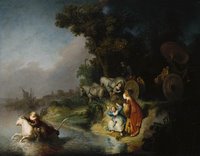 Most of the Greek and Roman myths you read in high school were re-tellings of stories from Ovid's Metamorphoses. Choose your favorite myth and read Ovid's version of that myth. Read also one of the Ovid myths that you *hadn't* read before. Cite one example for each myth that shows particularly well Ovid's "insight into the human condition."
Most of the Greek and Roman myths you read in high school were re-tellings of stories from Ovid's Metamorphoses. Choose your favorite myth and read Ovid's version of that myth. Read also one of the Ovid myths that you *hadn't* read before. Cite one example for each myth that shows particularly well Ovid's "insight into the human condition."If you want to get the overall picture of the Metamorphoses, see this excellent introduction and commentary by Larry Brown.

MAny of the names of these stories I had heard before and had atributted Roman legends. The only story I knew off the top of my head was that of Hercules. Hercules murdered his family and was set to do trails to make up for it. I did read a part in Book V about Perseus, along with stories about Ajax and Ulysses. Think the best way Ovids makes these people seems is that they were gods amongst men, but they all had faults just like the rest of us. -Trent Dean
ReplyDeleteThe only story I had of was the story of Hercules. Hercules goes through his many trials to prove he is the son of Zeus. Hercules was a god among the people. For the most part he blended in with the rest of society and didn't stand out as being a god. This is common in many of the other myth's such as Ajax and Ulysses where you have a god like hero who blends in with society
ReplyDeleteThe one story I new about was Hercules on how he had to prove that he was Zeus son. The story that I read was Midas and the golden touch. On how he wanted the power to touch every thing and it would turn in to gold. Well he got what he wanted literally every thing including food and water, so this mad life hard, so he prayed for it to go a way and it did.This one taught us that one should not be greedy and not focus on money, that all you need to do is ask for forgiveness and it shall be given. ---kirk
ReplyDeleteThe story that I also knew was that of Hercules and how he had to prove himself. I also agree that this showed how even though he was stronger then man he also was not completely a god and had his faults and has to prove himself to Zeus.
ReplyDeleteThe I didn't know anything about was Perseus and his story was the same of proving himself. He goes and kills Medusa but then seems to let the power take control of him and turns people left and right to stone. This shows the human nature that power corrupts everyone.
I have obviously heard of the stories of Hercules as well. Hercules is one of the iconic figures in today's world. He went through his life proving himself to Zeus. I thought the story of Pyramus and Thisbe was quite interesting. You can see a parallel to Romeo and Juliet. Obviously Pyramus and Thisbe were way before Shakespeare's story. It is a great story and shows how serious people took love in Rome. They were willing to die if they could not be together.
ReplyDeleteIf there are any friends here, turn your face away!’ and he held up the Gorgon’s head. ‘Find others, who might be worried by your marvel’ said Thesculus, but as he prepared to throw his deadly javelin, he was frozen, like a marble statue, in the act.
ReplyDeleteI enjoy the Perseus story and this line is effective because it reveals Thesculus to be not so friendly toward our hero and shows multiple layers of character motives.
Jackson Pasco
I had heard of many of these people referenced before however I only had really heard the story of Perseus, Achilles, Chaos, Ulysses, and Midas. I read the account of Achilles and it seemed to be a bit different than I remember. It mentioned that Poseidon had guided the arrow of Paris but it never mentioned where. When I was told the story by my Latin teacher he had mentioned that the arrow was poisoned and guided to the heal of his right foot, the foot which his mother was holding when she dipped him in the river Styx. What I got out of this story about human nature is that no matter how strong a man can be, no matter how brave or what have you, every man has his weakness. And Achilles' was his heel. The only place which he could be harmed by mortal weapons.
ReplyDeleteI read the story of Phoebus and how he hunted down a stag, speared the stag, and when the stag was dieing he mourned and prayed to the gods to spare the life of the poor stag. Well a god looked down on him and said he would mourn with him. I think this shows about human nature that some things which our society may find necessary for survival or necessary to be a member of society may not quite agree with your own morals. And that is ok! This story reminded me of another American story about president Abraham Lincoln. I remember from elementary school the story of how Lincoln killed a turkey hunting while he was a young man and as he saw it fall to the ground he felt terrible and vowed to never hunt again. Similar story with the same lesson.
Matthew Remmich